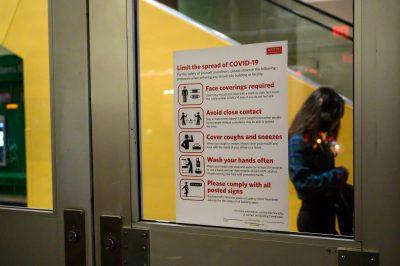
College of General Studies sophomore Quentin Blaizot created and circulated a petition titled “To Boston University : A Cure Worse than the Disease” earlier this semester, outlining his grievances with BU’s COVID-19 safety protocols and the decisions the University has made.
Blaizot disagrees with BU’s safety restrictions, which he said are overreaching, harsh and ineffective.
“Much of what has been imposed on the students is detrimental,” Blaizot wrote in the petition, “and to keep restrictions as they are will only serve to build resentment.”
In the petition, he further questioned the efficacy of widespread lockdowns in preventing virus transmission, the inability of students to visit residences they do not reside in and the encouragement of reporting others for COVID-19 safety violations on the part of the university.
Since it launched around the start of the Spring semester, the petition has 41 signatures total.
“We had 41 signatures, that’s not too bad,” Blaizot said. “It’s kind of dead in the water right now.”
After promoting it on @bu_gigs — an Instagram-turned-app marketplace where students buy and sell items — he said he believes the backlash the petition received caused the account to ban any petitions on the platform in the future.
Blaizot said one of his primary demands for the University is allowing students to travel between dormitories again because there is no authentic way to replicate social interactions virtually.
“Somebody who’s in Warren [Towers] isn’t going to have the same experience as someone who’s in Bay State,” he said. “How is someone in Bay State supposed to make connections here?”
His issue with the reporting of peers for COVID-19 violations, he said, is based on “the principle” rather than the specific circumstances surrounding the report.
“Good luck trying to build back a community if everybody knows that you’re going to snitch on them,” Blaizot said.
Blaizot also voiced his disapproval of BU’s decision to not lower tuition following the switch to the Learn from Anywhere model.
“Zoom classes just don’t cut it,” Blaizot said. “What we’re getting, it’s a half-assed education.”
Blaizot also serves as secretary for BU’s chapter of Young Americans for Liberty — “an organization that strives to advance a libertarian philosophy in the US,” according to its description on Engage.
The petition was not officially endorsed by YAL but does reflect some of the views held by its members — as a libertarian organization, members advocate for individual liberties and limited authoritative control.
BU YAL president Jonathan Stein, a senior in the Questrom School of Business, said it was “an invasion of privacy” and “extremely intrusive” of students to report their peers by submitting pictures and videos of pandemic safety violations.
“We do not believe that any institution should be encouraging that other people invade other people’s privacy,” he said.
Students on campus, indoors and outdoors, are required to wear a mask while distancing from others — a rule students returning to campus had to agree to at the beginning of the Fall semester — but Stein said that policy is unnecessary and based on misinformation.
“The science shows that when it comes to transmission outdoors, it is extremely low,” Stein said. “That is backed up in the scientific literature.”
While multi-layer cloth masks are successful at blocking 50-70% of fine droplets responsible for the spread of COVID-19, they may not be necessary when someone is alone outside or with members of the same household, according to the Centers for Disease Control and Prevention.
Stein also noted certain “fallacies” in BU’s decisions regarding the movement of students between residences as well.
“What’s the difference if a BU student goes between Warren and [33 Harry Agganis Way], versus somebody going from the second floor of StuVi and the tenth floor of StuVi?” he said. “At the end of the day, these are BU students who get tested two times a week.”
When it comes to anti-mask sentiment on campus, the BU Rock was at the center of that messaging — last month, the rock was covered in posters reading “ISOLATION KILLS PROTECT MENTAL HEALTH,” “BU: END FORCED TESTING” and “MASKS = INHUMAN.” Stein said YAL was not involved.
A picture of the rock uploaded to the @bu_gigs account was met with overwhelming backlash in the comments of the post.
College of Arts and Sciences sophomore Andre Butzberger said he saw the post online and decided to use spray paint to cover up the posters himself.
“It definitely crossed a line,” he said. “It kind of makes me feel bad that that kind of a student is here at BU because it’s embarrassing.”
While he acknowledged the annoyance of safety restrictions, Butzberger said he believes the campus policies are not an overreach and only serve to protect the general population.
“It’s an inconvenience for everyone,” he said, “it’s not like it’s singling people out and trying to be totalitarian.”
Butzberger said anti-maskers and those concerned their rights are being violated harbor “a dangerous opinion for everyone.”
BU spokesperson Colin Riley said COVID-19 regulations were a measure students were required to accept to return in person.
“Anyone who returned to campus had to accept the health commitments and expectations,” Riley said.
He noted many people experienced painful challenges and loss as a result of the pandemic, which has necessitated the rules currently in place.
“We understand, I think, most everyone,” Riley said, “has experienced some frustration dealing with the consequences of the pandemic.”
Butzberger said he believed the safety protocols are a temporary but ultimately necessary inconvenience for students.
“It’s to make sure we don’t get sent home again,” he said. “We don’t want a repeat of what happened last year.”